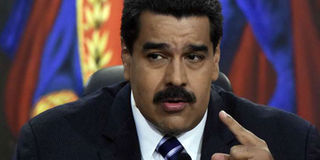Venezuela vote to shape US ties

Venezuelan President Nicolas Maduro speaks during a press conference at Miraflores presidential palace in Caracas on December 30, 2014. Maduro has just a 22 per cent approval rating, according to a Datanalysis survey, and Venezuela is enduring a 200 per cent annual inflation rate, a contracting economy and a shortage of basics that range from toilet paper to canned goods. PHOTO | AFP
What you need to know:
- Surveys show that opposition candidates are likely to make substantial inroads in Venezuela’s single-chamber National Assembly, where all 167 seats are in play.
WASHINGTON
The outcome of Venezuela’s legislative elections on Sunday, when the political left is in real danger of losing its majority for the first time since 1999, could greatly impact ties with the United States.
How will depend on the extent of the opposition’s gains and how the socialist government of President Nicolas Maduro reacts to it, observers say, amid fears that violence and unrest could break out.
Surveys show that opposition candidates are likely to make substantial inroads in Venezuela’s single-chamber National Assembly, where all 167 seats are in play.
Ameriacn officials are keeping a discreet eye on developments, but are wary of giving Maduro an excuse to rally support by railing against “imperialism” — even if the US is Venezuela’s main export market.
In many ways, Sunday’s vote is a referendum on Maduro — the handpicked successor to Hugo Chavez — and his economic policies.
Maduro has just a 22 per cent approval rating, according to a Datanalysis survey, and Venezuela is enduring a 200 per cent annual inflation rate, a contracting economy and a shortage of basics that range from toilet paper to canned goods.
Venezuela may have the world’s largest oil reserves, but its oil hit a seven-year low of $34.05 a barrel this week.
The country relies on oil exports for 96 per cent of its hard currency.
“The opposition’s margin of victory will define what will happen after the elections, both internally and regarding the US,” said Peter Schechter at the Atlantic Council think tank, based in Washington.





